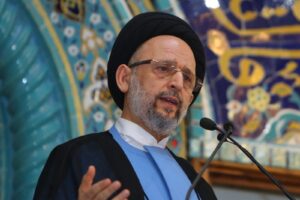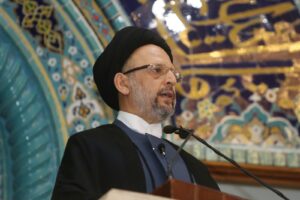Al-Tawabien Revolution
The first sermon
Allah, The Most Exalted, says in His Glorious Book: Indeed, I am the Perpetual Forgiver of whoever repents and believes and does righteousness and then continues in guidance. Allah, The Most Exalted, speaks the truth.
As we continue to highlight the repercussions of the Husseini revolution, we are going to talk today about the Tawabien revolution which started in Kufa:
After the martyrdom of Imam Al-Hussein, some of the people of this city felt remorseful, because they did not support the Imam.
This feeling was further inflamed when they saw the women of Ahl El-Beit driven as bondswomen and the heads of the Imam and his companion on the heads of spears, and then when they heard the famous speech of Zainab.
Five of the leaders of Kufa met to decide about what they ought to do to express their remorse and decided that their only option was to repent. … That is why their movement was called the revolution of the Tawabien (those who repented). The significance of this movement was that the revolutionaries did not find it sufficient to repent only; They also took some action. They went back to the rationale of the Imam and the revolutionary slogans he raised. They prepared for their uprising in absolute secrecy and inspired the Holy Ayat that says: So repent to your Creator and kill yourselves. That is best for [all of] you in the sight of your Creator.” Then He accepted your repentance; indeed, He is the Accepting of repentance, the Merciful. The leader of this revolution was Sulaiman bin Sard Al-Khuzaii. He was a companion of the Messenger (p.) who embraced Islam in Medina. And then he moved to Kufa where he became one of its leaders. He also fought courageously with Imam Ail in all of his wars and was one of his loyal followers.
The objectives of his movement were to overthrow the Umayyad Wali in Kufa and punish those who were responsible for the martyrdom of Imam Al-Hussein.
Sulaiman saw in the death of Yazid and the struggle for power among the Umayyad that followed a good opportunity to declare his revolution and start gaining new supporters. Thus, he sent envoys to Al-Madain and Basra. He gathered about four to five thousand strong at a place called Nukhaila on the crossroads between Ash-Sham, Kufa and Medina. There , he gave a speech to explain what he was revolting for, stressing that they did not seek any worldly gains , but only the satisfaction of Allah, The Most Exalted, and the revenge for the martyrdom of the Imam. He then led them to the grave of the Imam where they all cried and declared their repent saying: O Lord, we have let down the grandson of our Prophet. Forgive us for what we have done and except our repent. Shower Your mercy on Hussein and his martyr companions. And we declare before You that we adopt their religion and what they were killed for …”If we were denied [martyrdom] with him, we ask You not to deny it for us after him”.
Then they headed for Damascus (Sham). But before they reached there, they were met at Ain Darat in the north east of the capital by an army of ten thousand strong, led by Ubaiadllah bin Ziyad …
Although they were fewer in number, the Tawabien were able in the beginning to defeat the Umayyad army, which had to ask for support becoming a very large army of 30 thousand strong. Although the chances of winning became scarce, the Tawabien did not surrender and decided to fight until death and martyrdom.
This was the end of their revolution that provided the most wonderful lessons in sacrifice. It was a significant revolution in its historical context, being a ring in a chain whose immense sacrifices aroused the Muslim public opinion, and created a favorable opinion for the anti-Umayyad movements. Thus it was followed by the Mukhtar movement that also initiated in Kufa and held the same slogans .This revolution as well as the ones that followed demonstrated how the Husseini revolution awakened the nation.
Apart from its historical significance, there are many lessons of the Tawabien revolution, which we can inspire in our present; the most significant of them are the following:
The first lesson: When corruption is spread in the society, those who precede others in confronting it are the ones whom Allah, The Most Exalted rewards most. And those Foremost (in Faith) will be Foremost (in the Hereafter).in gardens of bliss.
The second lesson: in conflicts and struggles, when both the right and falsehood become clear, everyone should review his stand. He should relinquish his neglect and no longer remain heedless of his duties and responsibilities … One has to conduct this review to repent and gain Allah, The Most Exalted’s satisfaction.
The problem is that we do not possess this culture of review. We tend to be persistent and provide excuses for our wrong positions or attitudes saying that this is something that belongs to the past and we should not look back at it. Nevertheless, Allah, The Most Exalted, calls on us to review, repent and correct our faults. Such a review is necessary by individuals, parties, societies or states … They all have to review their stances.
The third lesson is related to timing: we have to review our stances in this life before we find ourselves in the point of no return in the Afterlife.
We are in a dire need to begin with a psychological repenting revolution which we would then apply it in our reality, for the one who repents to God and reviews his deeds and makes sure that he has not supported falsehood is a lucky one, as Allah, The Most Exalted, loves those who repent and would reward them in the Hereafter.
Praise be to Allah, The Most Exalted, Lord of the worlds.
The second sermon
Worshippers of Allah, The Most Exalted: I advise you and myself, to follow the model of Imam Zein Al-Abidien when a man from Medina abused the Imam and accused him of false accusations and the Imam listened to him in silence. When the man left, the Imam told his companions to accompany him to hear his response to that man. The companions thought that he will hurt him back but the Imam told the man:
“If what you said was true, then may God forgive me, and if it was false may Allah, The Most Exalted, forgive you.
The man felt ashamed of himself. He apologized and later became one the Imam’s faithful companions.
This is the best method that turns enemies into friends. It is what we are in a dire need of, being the method of the aware and the missionary and the method the Holy Quran called for: And good and evil are not alike. Repel (evil) with that (benign and graceful way) which is best, and lo, the person between whom and you there is enmity will behave as if he were your warm-hearted friend.
By this method, we gain friends and supporters and become capable of confronting challenges.
We begin with what happened, yesterday, in the port of Beirut. This is very dangerous incident that shocked the Lebanese who have not yet recovered from the previous shock of August 4, increased their frustration, despair and concern for the future and re-raised the questions concerning the ability of the government to run their affairs. This incident proved once again its incompetence, as it failed once more to protect this vital public utility.
Faced by this new catastrophe, and despite all the health, physical and environmental damages, and as we thank God that there were no casualties, we call on the government to speed up the discovery of the perpetrators and give the judiciary a free hand in this respect. We feel that not speeding up the investigation will pave the way for more catastrophes, because this catastrophe was the result of not being fast enough in discovering who was responsible for the first one.
In the meantime, we ought to appreciate all the efforts of the civil defense, firefighters and all those who took part in extinguishing the fire, whose consequences were feared to be similar to the previous catastrophe.
Going back to the health conditions where the corona cases continue to rise without any sign of a significant reversal that will not take place unless the citizens decide to follow all protection measures and consider those around them infected.
In this respect, we would like to reassert yet again that the religious, moral and humanitarian duties demand that we should abide by all the protection measures and advise others to do so.
On another level, the security situation returns to constitute a source of concern for the Lebanese, following the clashes that took place in Beirut and other places, which we are afraid, might be repeated.
Therefore, we call all the security forces to shoulder their responsibilities in taking all measures to face the unauthorized weapons. At the same time, we call the forces that are present on the ground to shoulder their responsibility and not to attempt to disclaim themselves. They should at least be committed to not to interfere when the security or judiciary powers put the deterring measures into effect.
The political parties should consider that the security of the country is a red line that ought not to be surpassed. If there are any political competitions or differences, they should not be solved by resorting to arms.
As to the outside pressures that were evident in the sanctions on two previous ministers mount, we are called upon to solidify our unity so that the latest incidents would become an incentive to remove the obstacles that face the formation of the government that, due to the challenges that face the country on all levels, should be based on the national interest and not those of a certain force or sect.
As for the meeting of the Arab League, we feel that not declaring a decisive stance against normalization further weakens the Palestinian position and encourages others to adopt the same policy.
Tag:Friday sermon




